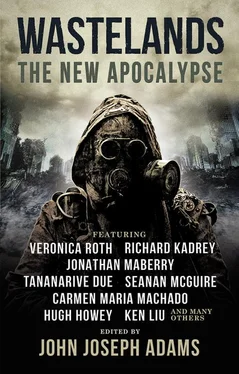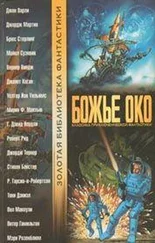Tulli, Moraine, and Kristi were only siblings in the spiritual way; their band name was a response to all the strangers who asked, “Are you triplets?”
When she felt thorny—so almost always—Kristi responded, “Because Natives look alike? No. Well. We might have the same great-uncle. He gotta reputation .”
“Hey! Tulli! Are you defacing the train?” Moraine shouted, as if she couldn’t hear him across three feet of recirculated air. “Don’t write our names! I’d rather not pay a fine.”
“Uh oh. I wrote our band name already.”
“Don’t worry,” Kristi said. “There’s no chance anybody will recognize it.”
So the Apparently Sibs weren’t remotely famous, but they’d been off to a promising start before the plague spread. On average, they played four paid shows a month and had sixty followers on Twitter (sixty-three, if you counted their mothers). With enough time, they could have serenaded the right person, signed a contract, and toured the world. Or, at the very least, toured states outside Texas.
Now, their on-stage corpse paint seemed like a premonition. What little humankind knew about the Big Plague pointed to a grim, albeit sluggish, prognosis. The poor souls who carried the strain had a year, more or less. Could be enough time to find a cure. Maybe even enough time to mobilize the largest treatment plan in human history. Unfortunately, some people crashed fast, their nervous systems torn apart.
A rap on the door announced breakfast: oatmeal and tea. The twenty-something, freckled nurse, Jon—is he the Jon of wall graffiti fame, Tulli wondered—prepared the food with automaton efficiency and took their temperatures. Ninety-nine, ninety-eight, one hundred and one point nine. Kristi was running a vigorous fever already.
“Can we do anything to slow her symptoms?” Tulli asked. Like all White Train nurses, Jon was a carrier, immune to the virus but contagious. Lucky: a hazmat suit would obscure the sympathetic crinkles around his eyes.
“Possibly,” he said. “The doctors at Mariposa Compound will do everything they can.” Jon dropped the disposable thermometer tips down a biohazard chute near the door. He hesitated in the exit, gazing beyond Tulli’s head, as if distracted by a memory. “Goodbye, then,” he said. “Call if you need anything.”
During breakfast, Tulli and Moraine hovered over Kristi, prepared to steady trembling hands as she drank lukewarm black tea. Full-body shakes were a late-stage plague symptom, but they begin with subtle tremors, and Kristi shivered when she choked down the dregs in her cup.
“It’s just chilly,” Moraine said, wrapping a black Pendleton blanket around Kristi’s shoulders. “We need sunlight. Open the curtains.”
“Good idea.” Tulli obliged, revealing the yellow desert. There were mountains in the distance and barrel cacti in the foreground. Nearby, a bird’s tattered, desiccated corpse hung from a coil of barbed wire. “You should both have a nap,” she suggested. “Terrible scenery.”
* * *
The Apparently Siblings first met during the Maria de Soto University Pow Wow and Cake Walk for Charity. As poor college freshmen, they were enticed by the one hundred dollar “best student intertribal dancer” prize, not community togetherness or actual dancing, pinkie swear. Tulli had to scour the boxes in her dorm room to find her neglected dancing regalia: turkey feather fan, knee-high doeskin boots, and thirty-pound jingle dress. It had been years since her last pow wow, and the dress clutched her hips and arms, uncomfortably tight. Do it for money , she thought. And maybe you’ll win a free cake, too. German chocolate would taste so good right now .
That year, the MdSUPWCWC, normally held on the soccer field, was moved to the indoor gymnasium in defiance of sparking, mountainous clouds overhead. The drum group sat in the center circle of the basketball court. They were surrounded by the dancing ring and crowded benches for participants.
Tulli noticed Moraine on the bench next to hers. Under the vibrant red fringe and sunset-colored beadwork that covered his grass dancer regalia, he resembled somebody in her music composition class, the kid who always answered Dr. Brumford’s rhetorical questions.
“Are you a music student at de Soto?” she asked.
“Yeah!” He lowered his Navajo taco to shake her hand. “I’m Moraine, like the glacial deposit. That’s a well-crafted jingle dress.”
“Thanks. My mom made it.”
“Blue suits you.”
“Maybe, but I wanted black and orange. Halloween colors. Mom hates the holiday.”
“Mine does, too! She thinks focusing on death and gloomy junk attracts evil.”
“My mom says I have ghost sickness.”
“What?”
“A mental shroud, a preoccupation with death, a fearful obsession that manifests as physical illness and psychic anguish. So basically I’m haunted because my favorite movie is Ringu .”
Moraine laughed.
“What if it’s real, though?” Tulli asked.
“You believe in the supernatural?”
Tulli shrugged. “I’m skeptical, but Moms have been right before.”
“Let’s test it. My throat hurts, and you’re wearing a jingle dress.”
“Okay?”
“Jingle dancing is supposed to heal people, right?”
“Maybe. It healed at least one person. Like a hundred and fifty years ago. Reputedly. An Ojibwe girl, I think? Dunno, man.” Jingle dresses, draped with hollow silver cones, clang with every leap. Tulli loved their rhythm, that’s all. She knew zilch about the origin of the dance, its significance. Not like they taught that in public school.
“Try to heal me,” Moraine insisted. “I want to believe.”
A young woman—fancy shawl dancer, her regalia cluttered with shades of yellow and pink—stepped between Tulli and Moraine. “First,” she said, “ghosts are real. They look like shadows, and your jingle dress test doesn’t prove anything. Actually, it’s borderline offensive, so don’t let respectable people hear you. Second: I think you’re both in my music composition class. Hey. I’m—”
“Kristi,” Moraine said. “Yeah, I know! Great to officially meet you!”
They spent the pow wow arguing about ghosts—Moraine insisted that the shadowy figures Kristi saw at night were symptoms of sleep paralysis, Kristi thought he was just scared of the unfathomable truth, and Tulli remained noncommittal. However, they didn’t annoy each other too much, so friendship inevitably blossomed.
None of them won the competition. That prize went to a hoop dancer math major.
Five years later, Tulli truly loved her buddies. She couldn’t envision better people to live with. To die with.
Hopefully, the death part would take its sweet time.
* * *
The White Train’s mechanical heartbeat, a low whir that sounded nothing like the chug, chug, chug in movies, was punctuated by Tulli’s fingers drumming on the windowsill and her steel-toed boots tapping the vinyl floor. They were nearing the Mojave Desert, where several compounds, including Mariposa, treated high-threat contagious citizens away from the lucky uninfected.
Kristi’s reflection appeared in the glass, her wide eyes transposed over the cloudless sky. The Pendleton fell in a heap at her feet.
“Sorry, Hon,” Tulli said, turning. “Did my drumming disturb you?”
“My dream…” Kristi pointed to a silhouette that cut the white-blue sky with long, sharp wings. “She was in my dream.”
“That’s just a turkey vulture. Strange. I didn’t know they lived here. Don’t quote me on that before I Google it, though. Go back to—”
“She sent them. They’re her children, vultures. Eating… eating sick, old meat. To help make the world clean.”
Читать дальше


![Nick Cracknell - The Quiet Apocalypse [= Island Zero]](/books/28041/nick-cracknell-the-quiet-apocalypse-island-zero-thumb.webp)









